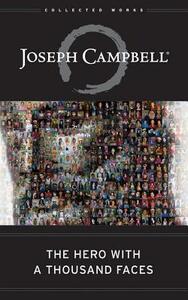Take a photo of a barcode or cover
challenging
informative
inspiring
reflective
tense
slow-paced
I enjoyed the first part immensely >> but the second part was very boring and I couldn’t keep my interest/focus. In general, it’s an informative book with so many enlightening questions and ideas 💡
informative
medium-paced
2024 - I completely forgot reading this book 15 years ago. The review I wrote does not seem to fit the book, though I suppose that may be because my beliefs have changed a bit. Lots of interesting mythology and some good food for thought near the end.
2009 - Campbell tells the universal story (the "monomyth") in this very interesting book. Looking through all world cultures and religions we find a very common story. It is no surprise this book was a great influence on George Lucas, for the story of Luke Skywalker in Star Wars possesses many traits of the monomyth (as does the story of Harry Potter and probably most epic movies if we think about it). I appreciate this book for its breadth as stories from all regions of the world are brought in. My main complaint is that in looking at the similarities of the world's religions alone is reductionistic in ignoring the differences. A lot of uniqueness in Christianity and Islam must be ignored, which causes me to wonder what was ignored in the stories/religions/myths of other cultures. Also, some of the Christian stories mentioned have absolutely no basis in actual history and have no legitimacy in mainstream Christianity. This makes me wonder if the stories of religions I am not as familiar with are mainstream to those religions or obviously fictional creations. But overall, an interesting read.
2009 - Campbell tells the universal story (the "monomyth") in this very interesting book. Looking through all world cultures and religions we find a very common story. It is no surprise this book was a great influence on George Lucas, for the story of Luke Skywalker in Star Wars possesses many traits of the monomyth (as does the story of Harry Potter and probably most epic movies if we think about it). I appreciate this book for its breadth as stories from all regions of the world are brought in. My main complaint is that in looking at the similarities of the world's religions alone is reductionistic in ignoring the differences. A lot of uniqueness in Christianity and Islam must be ignored, which causes me to wonder what was ignored in the stories/religions/myths of other cultures. Also, some of the Christian stories mentioned have absolutely no basis in actual history and have no legitimacy in mainstream Christianity. This makes me wonder if the stories of religions I am not as familiar with are mainstream to those religions or obviously fictional creations. But overall, an interesting read.
Fascinating and confusing at the same time. At one time society had a better understanding of the world and where human life resided within it. Now all of that has shifted to individual goals and business ethics. Something has been lost and too few take the time to and or know how to find it again.
informative
inspiring
reflective
slow-paced
challenging
emotional
informative
inspiring
mysterious
reflective
slow-paced
challenging
informative
reflective
slow-paced
To review a book like this from my perspective seems pretty silly. I had many reasons to read this: to prepare for grad school one day, to ready myself for reading The Silmarillion, to gain a better appreciation for my favorite video game series, to further understand what makes a person become a legend, and to have a richer understanding of intertextuality. Certainly, I didn't read this book to agree with the concept of the Monomyth: the books assertion that all myths tell the same story. I also didn't read this book to be convinced on the truth of psychoanalytic theory, its foundational method of understanding stories. Luckily, the book didn't try to convince me of any of those things. It confidently stated its points and moved on, often without elaborating on or arguing its own truth. And I respect that. But it does make it hard to follow as a nonacademic more than 70 years later. That said, what I did follow, I enjoyed. And I took it all with a hefty grain of salt. I'm not convinced that this is the final method of interpreting myth. Luckily, the book itself explictly states that such a thing will never come to be. I feel enriched for having read it. I feel exhausted for having read it. I'm not giving this a star rating, because that would be such a silly and useless thing to give it.
Not only a seminal book for any writer and creator, but an important read for any person who wants to expand their knowledge of myth and religion and realise more about the adventure each of us has embarked on since birth.
The material is fascinating, and it's truly fascinating how so many cultures from around the world throughout the history of time came up with a similar mythology.
There is a lot of really good information in this book. It's my first Joseph Campbell book and if you want to know (indepth) the journey of the hero this is for you.
slow-paced





